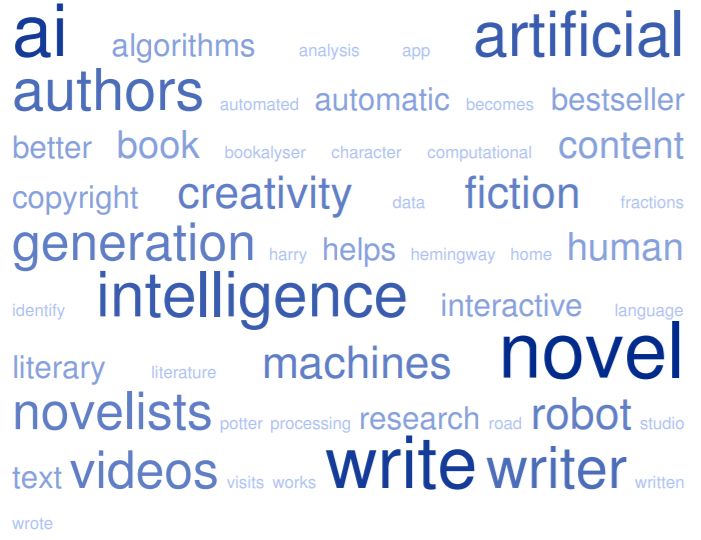
Notes:
Automatic novel generation is a subfield of natural language processing (NLP) that involves using computer algorithms to generate complete, coherent, and grammatically correct novels or story-like texts. This can be done either by training a model on a large dataset of existing novels or by using some form of generative techniques.
The process of automatic novel generation typically involves several steps:
- Data collection: A large dataset of existing novels is collected to train the model.
- Text preprocessing: The collected text is preprocessed to remove any unwanted characters or symbols.
- Model training: A machine learning model, such as a recurrent neural network (RNN) or a transformer, is trained on the preprocessed text dataset.
- Generation: Once the model is trained, it can be used to generate new, original novels by sampling from the learned probability distribution of the training dataset.
- Evaluation: Generated novels are evaluated by humans for coherence, grammar, and readability.
Automatic novel generation is still an active area of research, and the quality of the generated novels is still a subject of debate. However, recent advancements in deep learning, natural language processing, and generative models have led to the generation of novels that are increasingly coherent, grammatically correct and sometimes even indistinguishable from human-written novels.
The main applications for automatic novel generation are to help authors overcome writer’s block, or to provide a tool for creative writing and storytelling. It can also be used in the entertainment industry such as video games or movies to generate a story, or to create a new story for an existing game.
Resources:
- bookalyser.com .. helps identify issues with texts
- hemingwayapp.com .. hemingway editor desktop app
- nanogenmo.github.io .. national novel generation month
- storyfit.com .. ai superpowers for publishers and studios
- writingexercises.co.uk .. generate story ideas, plots, characters
References:
- Will Robots Make the Next Big Bestsellers? (25 Oct 2019)
- The Bestseller Code: Anatomy of the Blockbuster Novel (2017)
- Computational Creativity Research: Towards Creative Machines (2015)
See also:
100 Best Botnik Videos | 100 Best Predictive Keyboard Videos | Automated Journalism Meta Guide | Automatic Book Generation | Computational Creativity & Dialog Systems | Generative Literature & Natural Language Processing | Generative Text & Natural Language Processing
[Apr 2019]
- Artificial Intelligence Can Now Write Amazing Content — What Does That Mean For Humans? (28 Mar 2019)
- Opinion | Artificial Intelligence may prove to be the right stuff for writers (27 Mar 2019)
- The rise of robot authors: is the writing on the wall for human novelists? (25 Mar 2019)
- Could AI replace human writers? (22 Mar 2019)
- Microsoft AI “Zo” Is a Novel Inspiration (9 Jan 2019)
- We asked artificial intelligence to analyze a graphic novel – and found both limits and new insights (5 Dec 2018)
- What big data can tell us about how a book becomes a best-seller (28 Nov 2018)
- The good book: Bible helps researchers perfect translation algorithms (24 Oct 2018)
- Novelists Have a Boring New Gimmick: Writing Dull Books With AI (18 Oct 2018)
- An AI Took a Road Trip and Wrote a Terrible Novel About It (4 Oct 2018)
- How ‘Word Cops’ Unmask Anonymous Authors (14 Sep 2018)
- Could text analysis tool The Bookalyser be a copy-editor’s new best friend? (06 July 2018)
- How Canadian-made artificial intelligence is helping Hollywood write better scripts (23 Jun 2018)
- Artificial intelligence is writing fairy tales now, and humanity is doomed (17 Apr 2018)
- O fractions, my fractions!Machines are getting better at literary analysis (8 Mar 2018)
- Professor uses big data to research history of gender in fiction (28 Feb 2018)
- How artificial intelligence is creating new ways of storytelling (12 Jan 2018)
- Could AI write a novel like Hemingway? (18 Dec 2017)
- AI Attempts To Write Harry Potter And It Goes Hilariously Wrong (14 Dec 2017)
- Modern copyright law can’t keep pace with thinking machines (13 Dec 2017)
- This Harry Potter AI-generated fanfiction is remarkably good (12 Dec 2017)
- Novel approach to AI wages war on writer’s block (2 Nov 2017)
- Creative writing robots will steal authors’ jobs in the near future (6 Oct 2017)
- Want to write a bestselling novel? Use an algorithm (23 Sep 2017)
- Artificial Intelligence Pens Next Installment of ‘Game of Thrones’ Novels (30 Aug 2017)
- The Dilemma Of Fair Use And Expressive Machine Learning: An Interview With Ben Sobel (23 Aug 2017)
- Anti-plagiarism AI bot can identify written works composed by the same author (9 Aug 2017)
- The Heretical Things Statistics Tell Us About Fiction (27 Jul 2017)
- Should robot artists be given copyright protection? (26 Jun 2017)
- Want to be a better writer? Try letting a robot tell you what to do (4 Jun 2017)
- An AI wrote all of David Hasselhoff’s lines in this bizarre short film (25 Apr 2017)
- The art of algorithms: How automation is affecting creativity (15 Apr 2017)
- Renault ZOE writes On the Road fanfic, becomes first AI hipster (11 Apr 2017)
- Nabokov’s Favorite Word Is Mauve’ Crunches The (Literary) Numbers (31 Mar 2017)
- The words that give away a writer’s gender, in classic works of literature (20 Mar 2017)
- Don’t like the way you write? An artificial intelligence app promises to polish your prose (9 Mar 2017)
- Japanese AI Writes a Novel, Nearly Wins Literary Award (24 Mar 2016)